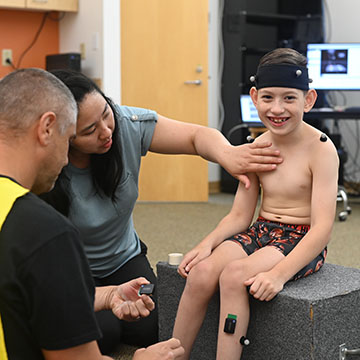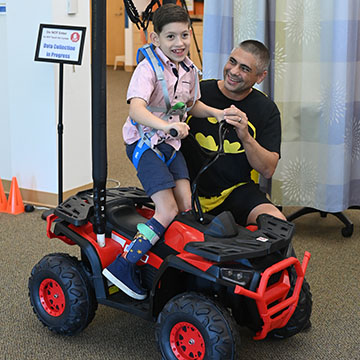UNF biomechanics lab recruiting pediatric patients with cerebral palsy for power mobility studies
 The University of North Florida’s Laboratory of Applied Biomechanics and Engineering (LABE) is recruiting pediatric patients with cerebral palsy for power mobility clinical trials. Families selected for the studies will visit UNF three times over six months for one-hour sessions, with children participating in walking and balance tests. Each child will then receive a stand-on, ride-on toy car adapted specifically for them to use at home.
The University of North Florida’s Laboratory of Applied Biomechanics and Engineering (LABE) is recruiting pediatric patients with cerebral palsy for power mobility clinical trials. Families selected for the studies will visit UNF three times over six months for one-hour sessions, with children participating in walking and balance tests. Each child will then receive a stand-on, ride-on toy car adapted specifically for them to use at home.
The clinical trials, funded by the National Institutes of Health and the Foundation for Physical Therapy Research, are looking at the impact that stand-on power mobility has on the physical function of children. Many children with cerebral palsy have limited postural control and walking capabilities, which can deprive them of participation in life activities and lead to delayed development and low quality of life.
“The UNF professors and students are incredibly caring and compassionate,” said Antonina Nesterenko, mother to three-year-old Andjay who is part of the study. “It’s inspiring to see their dedication to helping our children thrive.”
Ride-on or stand-on power mobility devices allow for the self-generated, active control of mobility and maintaining posture to improve children’s balance and lower extremity strength. UNF received a patent for a related ride-on device last year.
The UNF trials are the only known studies evaluating biomechanical factors underlying expected changes in balance and mobility function after stand-on, ride-on device usage. The results will guide future intervention work and enhance functional outcomes.
The studies are led by Dr. Guilherme (Gui) Cesar, UNF physical therapy assistant professor and rehabilitation researcher who has used his biomechanics background to work with distinct populations spanning from skillful athletes to children with neurologic disabilities, and Dr. Juan Aceros, UNF engineering associate professor and expert in the fabrication of biomedical devices and assistive technologies. Biomechanical research at the UNF LABE began in 2022 and has been published in nearly a dozen research articles over the last two years.
“We are grateful for the funding from NIH and Foundation for Physical Therapy Research that allows us to conduct this important, meaningful research,” said Cesar. “It’s so powerful to see the difference we can make in these children’s lives.”
 The UNF engineering and physical therapy departments have been engaged in interdisciplinary education aimed at helping children in the community for over a decade. UNF students designed, built and presented adaptive toy cars for children with special needs as part of the UNF Adaptive Toy project from 2014 to 2019, watch the story. These new studies take the Adaptive Toy project work to the next level in helping children locally and eventually around the globe.
The UNF engineering and physical therapy departments have been engaged in interdisciplinary education aimed at helping children in the community for over a decade. UNF students designed, built and presented adaptive toy cars for children with special needs as part of the UNF Adaptive Toy project from 2014 to 2019, watch the story. These new studies take the Adaptive Toy project work to the next level in helping children locally and eventually around the globe.
Finn Valentin is an eight-year-old boy with cerebral palsy who is part of the current study and participated in the previous UNF Adaptive Toy Project.
“Finn drove his first car until he couldn’t squeeze into it anymore,” said his mother, Jenny Buckman. “We are so happy to be back participating in another incredible UNF project.”
UNF’s LABE is a cutting-edge biomechanics research facility dedicated to the interdisciplinary study and development of novel biomedical devices and technologies aimed at improving human health, well-being and performance.
To enroll in the study and for more information, visit https://labe.domains.unf.edu/.
